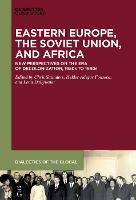


|
|
|
books
| book details |
Eastern Europe, the Soviet Union, and Africa: New Perspectives on the Era of Decolonization, 1950s to 1990s
Edited by Chris Saunders, Edited by Helder Adegar Fonseca, Edited by Lena Dallywater

|
This book is currently unavailable. Enquire to check if we can source a used copy
|
| book description |
It is now widely recognised that a Cold War perspective falls short in unfolding the complex geographies of connections and the multipolarity of actions and transactions that were shaped through the movement of individuals and ideas from Africa to the ""East"" and from the ""East"" to Africa in the decades in which African countries moved to independence. Adopting an interdisciplinary, transregional perspective, this volume casts new light on aspects of the role of Eastern Europe and the Soviet Union in the decolonisation of Africa. Taking further themes explored in a collection of essays published by the editors in 2019, the twelve case studies by authors from South Africa, Czech Republic, Portugal, Russia, Hungary, Italy, Canada, Serbia, and Germany draw on new sources to explore the history of the ties that existed between African liberation movements and the socialist bloc, some of which continue to influence relationships today. Chapters contribute to three relevant main themes that resonate in a number of scholarly fields of inquiry, ranging from Global Studies, Transregional Studies, Cold War Studies, (Global) History to African Studies, Eastern European, Russian and Slavic Studies: Reconsiderations, Resources, and Reverberations. Drawing upon newly opened archives and combining transregional perspectives with sources in different languages, chapters explicitly point out the shortcomings of past research and debates in the respective field. They highlight new avenues which have been developing and which need to be further developed (Reconsiderations). Selected case studies address the resources of those being active and involved in decolonisation processes, be it in East, North, West and South. They reveal: Which resources (both material and intellectual) are the actors drawing upon? On the other hand: From which resources are individuals on one side or the other reciprocally or intermittently (intentionally) kept away? (Resources). Finally, the third theme puts an emphasis on the historicity of the processes depicted. Studies point to the gaps and dead ends of international support, the paths that peter out, but also to repercussions and reverberations up until today. (Reverberations) Taken these three themes together, the individual chapters contribute to the overall question of: Which general historical narratives about the second half of the 20th century are changing based on these new research findings?
| product details |
Normally shipped |
Publisher | De Gruyter
Published date | 27 Apr 2023
Language |
Format | Hardback
Pages | 378
Dimensions | 230 x 155 x 0mm (L x W x H)
Weight | 672g
ISBN | 978-3-1107-7926-4
Readership Age |
BISAC | history / world
| other options |
|
|
|
To view the items in your trolley please sign in.
| sign in |
|
|
|
| specials |
|
|
This first comprehensive biography of Cecil Rhodes in a generation illuminates Rhodes’s vision for the expansion of imperialism in southern Africa, connecting politics and industry to internal development, and examines how this fueled a lasting, white-dominated colonial society.
|
|
Let's stare the future down and, instead of fearing AI, become solutionists.
|
|
|
|